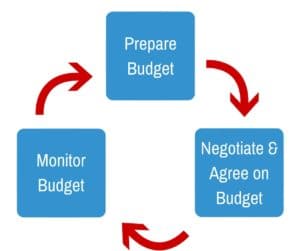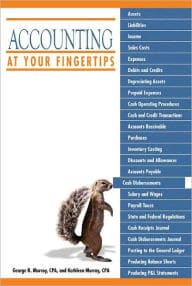Do you need to take an umbrella to work today?
Without a trusty weather app or friendly meteorologist, it would be difficult to know the answer. Fortunately, you probably have one of these tools to help you make an informed decision.
The CFO/Controller is the meteorologist for the business. It’s your job to help the company decide when, and if, you’ll need an umbrella. How do you do this? Prepare a budget.
![prepare a budget]() What is a budget?
What is a budget?
A budget is an estimate of income and expenses within a given amount of time. It contains economic goals, boundaries, and limits on expenditures of the organization.
Why Prepare a Budget?
So, why prepare a budget? By creating a budget, you’ll be able to hold the company accountable for its expenditures, reduce costs, and prepare for a worst case scenario. It serves as a measurement tool that can visually illustrate if you have enough cash to operate or to grow.
The steps in the budgeting process are:
- Prepare the budget
- Negotiate and agree on the budget
- Monitor the budget
Prepare a Budget
First, you as the financial leader must choose what type of budgeting method you want to use. There are two main types of budgets: zero-based budgets and traditional budgets. While zero-based budgeting allows you to re-examine all of your costs, traditional budgeting is more user-friendly.
Typically, prepare the annual budgets before the fiscal year begins. This window of preparation helps facilitate execution. Early decision-making will provide boundaries within which the company must abide. Oftentimes, if you don’t prepare budget ahead of time and create it on the spot, then arguments and internal issues begin to arise. You can avoid disputes when executing a budget by preparing early.
During preparation, it’s important to focus on fiscal targets. Fiscal targets are are goals for specific financial categories. These could include profit, debt payback schedule, operating expenses, projected borrowing requirements, etc. By laying out these goals, you’ll be better equipped to prepare a budget that will allow negotiating and finalizing of the budget to go smoothly.
Optimistic Budgets
To reduce the chances of creating an overoptimistic budget, it’s important to go back to the basics. By focusing on the economics of your business, you’ll not only create a realistic budget, but you’ll be better able to project future growth.
[box](NOTE: Want an easy tool to analyze your company’s economics? Download the Know Your Economics Worksheet to make sure you’re pricing for profit!)[/box]
Negotiate and Agree on the Budget
As with most things in business, negotiation comes into play. The purpose of negotiation is to allocate resources according to your targets and policies with everyone’s best interest in mind. However, fiscal policies should provide the framework for budget formulation. Make sure that you consider your company’s economics when structuring the budget.
By comparison, negotiation is all about a group of people working towards one goal. Part of this goal should be to comply with fiscal policies and targets.
So much time and hard work goes into creating a budget, yet so many companies fail to utilize the budget. The purpose of a budget is to measure operational efficiency and performance issues.
The efforts of budgeting should be focused on improving revenue forecasting or projecting. A budget is useless unless utilized in a dynamic manner. While budgeting provides the short-term execution plan, forecasting allows you to take historical data to measure the reality of success in executing your budget. You’ll be better able to allocate resources to the right departments.
(Check out the 5 tools that you might not be using but should be implementing along side your budget.)
When you link the budget and the forecast, you’ll be more equipped to monitor the budget. Contrast this with a static budget that is often useless after the first month. It all starts by knowing your unit economics and then assessing your economics to judge whether they are working for your company.
To ensure that your budget is built to achieve your business goals, make sure to start with the basics. Find out more about how you could utilize your unit economics to add more value to your organization by clicking the link below.
[box]Strategic CFO Lab Member Extra
Access your Strategic Pricing Model Execution Plan in SCFO Lab. The step-by-step plan to set your prices to maximize profits.
Click here to learn more about SCFO Labs[/box]
There are many methods you can use to improve productivity in your company. Click here to download a PDF of 10 Ways a CFO Can Improve Productivity.




























